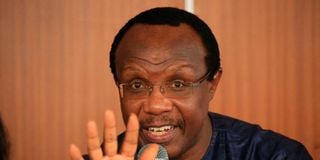Premium
The state, deep state and real state

Dr David Ndii, President William Ruto’s economic advisor. On Monday evening, economist David Ndii, chair of the President’s Economic Advisory Council, gave a mind-bending candid interview on TV about the miserable state of Kenya’s public purse.
On Monday evening, economist David Ndii, chair of the President’s Economic Advisory Council, gave a mind-bending candid interview on TV about the miserable state of Kenya’s public purse.
“The government is very wasteful. There is no single day that I am not irritated by not just how wasteful it is, but also how deliberate and unbothered people [in the state] are in wasting [public] funds,” Dr Ndii said.
Painting a pessimistic picture, Ndii said that, at the moment, “There is nothing anybody can do to stop the wastage. No institution or administration can help to change the situation, but what can be done is come up with systems that can try and put value for money, and also strengthen the Auditor-General’s office so that it can do more on value for money.” Ndii also noted that it is not just the Kenyan government that is wasteful. Most governments are.
In so doing, he pointed to what the big game here precisely is. In other words, Ndii is talking about “state capture”, just not the type that is popular in Kenyan political discourse and electioneering.
As in Jacob Zuma’s South Africa, state capture in Kenya usually refers to the malady where the President, his wives, children and ruling party heavies, acting with corrupt outsiders, form an alliance to seize control of government policy, allocation of goods by the state (usually contracts) and payments. They then go on to amass wealth for themselves and their associates.
This is usually a capture of the top of the pyramid, a seizure of the milk’s cream. Here, you have the allocation of contracts to build big dams, railways, and ports, buy aircraft for the national carrier, supply weapons for the Army, big tax exemptions, a monopoly on procuring fuel for the country and possibly fertiliser or maize flour during a food crisis.
That’s capture of the top layer, we understand, and the media loves to tell us stories about it. It is terrible, but probably not as bad as what happens in the second and third-tier of state capture. This middle- and bottom capture provides quite a bit of the exasperation Ndii spoke of. It can be complex and is very good at flying under the radar.
American politics
We will give an example. American politics, especially at the state level, is quite corrupt. I have a friend who is a Democratic Party operative and knows a lot about eating in the middle and bottom in states where Democrats have a stranglehold.
He told me about New York. It has about 1,400 public toilets. People like him, he told me, don’t bid to build highways or new schools. They get handed by their buddies that they helped win elections the contracts to supply things like toilet paper to public restrooms.
If you inflate the price of toilet paper by just $1 (Sh130) and supply each of the 1,400 public restrooms with 25 toilet rolls a day, you are making $35,000 (Sh4.6 million) a day and Sh136 million a month (if you inflate it by $2, you become a shilling billionaire in six months).
It’s a huge amount of money, but it’s not on the radar of most New Yorkers. And once you have the contract, hardly anyone will fight you for it. It’s easier to get through the reform of education than to change the toilet paper tender policy.
Ndii unwittingly illustrated how intractable reforming patronage in the middle can be, with the example of what happened after President William Ruto’s government cut down the number of officers going for foreign trips to three per delegation. They arrived at a foreign conference to find that virtually a whole line ministry had travelled there.
This capture of the middle- and lower-state tiers is described by some as “bureaucratic capture”. It is leaderless. It is incremental and very clever. Unfortunately for Kenya, it becomes very entrenched with political stability. Kenya has never had a successful military coup or change of regime through armed rebellion.
Below the principal secretary (PS) level, it has been undisturbed; so it has had three generations since independence which have painstakingly accumulated this bureaucratic power and passed it on to successors.
In Uganda, several wars smashed not just the political class but the bureaucracy and they’re even hardly any records from the past. In Rwanda, everyone was wasted in the 1994 Genocide against the Tutsi and the uprooting and relocation of the state to the jungles of the eastern Democratic Republic of Congo (DRC). These countries had the kind of blank slate to start the whole government that Kenya could only dream of.
The power of the second and third tiers is buried in mounds of files, arcane rituals, standing orders, obscure gazette notices, deep knowledge of the innards of state structure and complex hierarchies in the civil service. To appreciate this, look at the civil service salary structure. Like that of the United Nations, it will give any sane outsider a migraine trying to decipher it.
Waste in government is not waste or inefficiency; it is a well-tuned special-purpose vehicle with which bureaucratic power distributes patronage. It’s not the “deep state”. It is the real state.
Mr Onyango-Obbo is a journalist, writer and curator of the “Wall of Great Africans”. @cobbo3





